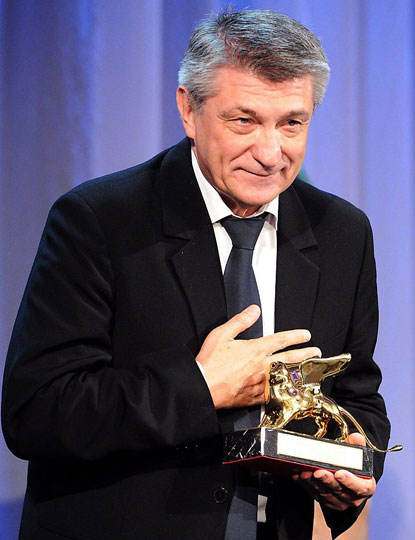| Sokurov's Deal With the Devil Epic Takes Top Prize |
| Monday, 03 October 2011 04:08 | |||
|
Following his mentor Andrei Tarkovsky, Alexander Sokurov became the fourth Russian director to win the Golden Lion with "Faust."  Alexander Sokurov's much anticipated "Faust," inspired by Goethe's classic interpretation of the legend and filmed in German, was a popular winner at the Venice Film Festival earlier this month. It was the highest recognition for a filmmaker who long deserved a place at the table of great Russian film directors, said critics and colleagues. "There are some films that make you cry, there are some films that make you laugh, there are some films that change you forever after you see them; and this is one of them," said Darren Aronofsky, director of "Black Swan" and head of the festival jury. Accepting the award, Sokurov said it was an "emotional" moment for him and noted that "serious, deeply felt auteur cinema is becoming more and more difficult" without government support. He should know, as his film never would have been made without an unlikely supporter - Russian Prime Minister Vladimir Putin. It has been a long journey for Sokurov. His early films were banned in Soviet times, and the first three films of his trilogy, which Faust completes, although highly praised, were mostly ignored by the international festivals. "He has been aiming for this award all his life," said producer Andrei Sigle, who said he had to convince Sokurov to enter the film in the competition after previous disappointments. His trilogy of films about dictators - Lenin, Stalin and Emperor Hirohito in "Moloch," "Taurus" and "The Sun," respectively - together form a prequel to "Faust," the archetypal deal-with-the-devil story. His biggest success before "Faust" was with "Russian Ark," filmed in the State Hermitage Museum in St. Petersburg in one continous take, which wowed the international art-house crowd in 2002. Sokurov, a figure whose inability to compromise has seen him feted more abroad than at home, did not receive any funding from the Ministry of Culture to make this film - and for that reason it might not have been made. But money appeared after Putin spoke out in support of the filming of "Faust." Why Putin supported the film is still a mystery to Sokurov, who met with the prime minister and acknowledged the importance of his support. The fact that his film is about Faust, he thinks, was an important factor, the director said in an interview. "I'm not sure if [the film] will be interesting for him, although he knows the German language and German culture is close to him," he said. "I don't understand why such help was given; I am not a supporter of those who support the political culture in Russia." Sokurov's candor regarding his lack of love for Russian politics is typical: The director is known for saying what he thinks. His early films were banned by Soviet authorities, which in a way brought him more international attention.  Sokurov says his serial obsessions with dictators and "Faust" itself, which is the culmination of the quartet of films, goes back 30 years. "It's amazing that there is so little attention paid to Faust," he said. "If any politician reads 'Faust,' everything is there." Ironically, Sokurov was vehement about his dislike of the festival experience before going to Venice. "I don't like being there. I don't like the system of competition," Sokurov, 60, said while sitting on a park bench. "How can you say that I am better? Directors with a name should not compete with young cinema people." Sokurov is outspoken on all fronts, and has long been a campaigner for the preservation of his home city's historical architecture, and has been fiercely critical of the St. Petersburg government, so critical that an opera he was staging at the Mikhailovsky Theater was shelved after he signed a letter attacking city policies. He is also at the helm of the campaign to save Lenfilm, the second most famous Russian film studio after Mosfilm. The studio may be taken over by the media holding of the huge conglomerate Sistema Financial Corp. Sistema's promises to preserve the studio have been met by disbelief by a number of Russian directors, who have spoken out against the move. Sokurov began his film career at Lenfilm after he received a recommendation by seminal director Andrei Tarkovsky, the author of "Andrei Rublyov" and "Solaris." Lenfilm in St. Petersburg has long had a reputation for being more supportive of art-house directors than its rival Mosfilm. But Lenfilm makes a few films a year and is in dire straits. There were some doubters among critics at Venice who found Sokurov's art-house style deliberately obscure. But Sokurov doesn't like critics either. One of the few exceptions is the late Susan Sontag, who he said added to his own understanding. "No one is going to be harsher than me in criticism," he added. "I know what I wanted to do and what didn't work better than anyone."
|

